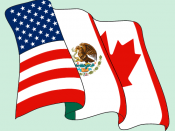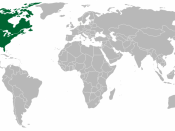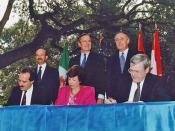Regional Integration Paper � PAGE \* MERGEFORMAT �1�
Against Regional Integration
Against of Regional Integration
The implementation of the Free Trade in North America (NAFTA) in 1994 and the establishment of the World Trade Organization (WTO) in 1995 were presented as a way to create global prosperity. However, results have shown that this business model, driven by the business sector, has caused a deterioration of labor rights and environmental standards, a weakening of health and public safety is an increasing exploitation of the environment and natural resources, loss of food security, loss of wages, reduced employment unionized labor flexibility and a growing poverty and economic inequality.
Although the tide has been running strongly in favor of regional free trade agreements in recent years, some economists articles, have expressed concern that the benefits of regional integration have been oversold, while the costs have often been ignored. They point out that the benefits of regional integration are determined by the extent of trade creation, as opposed to trade diversion.
Trade creation occurs when low-cost producers within the free trade area replace high-cost domestic producers. It may also occur when lower cost external producers within the free trade area replace higher cost external producers. Trade diversion occurs when higher cost suppliers replace lower cost external suppliers within the free trade area. A regional free trade agreement will benefit the world only if the amount of trade it creates exceeds the amount it diverts.
Those who opposed NAFTA claimed that ratification would be followed by a mass exodus of jobs from the United States and Canada into Mexico as employers sought to profit from Mexico's lower wages and less strict environmental and labor laws.
There was also opposition in Mexico to NAFTA from those who feared a loss of national sovereignty. Mexican...


